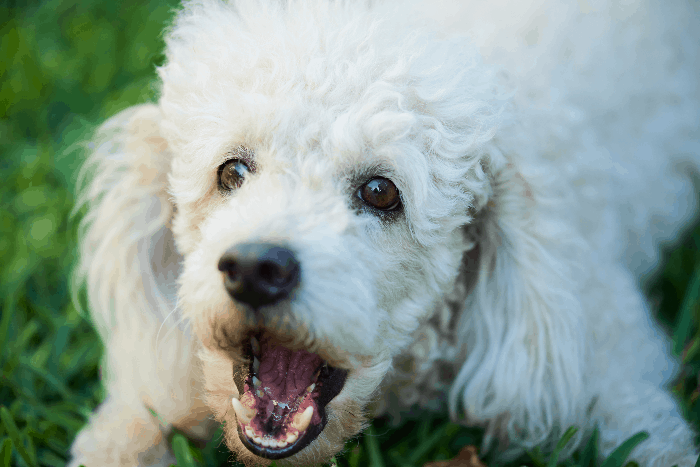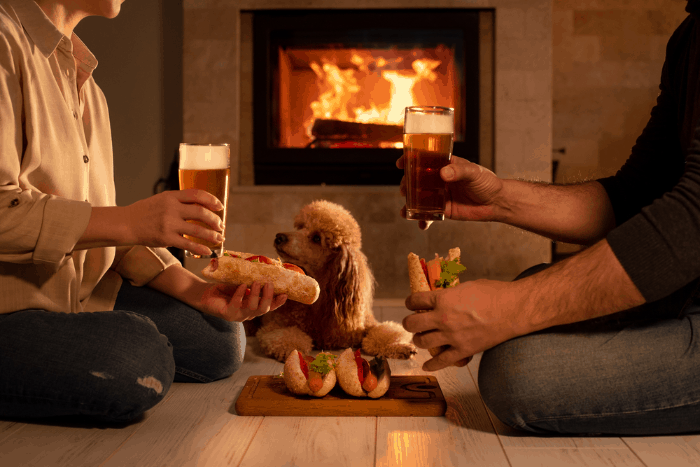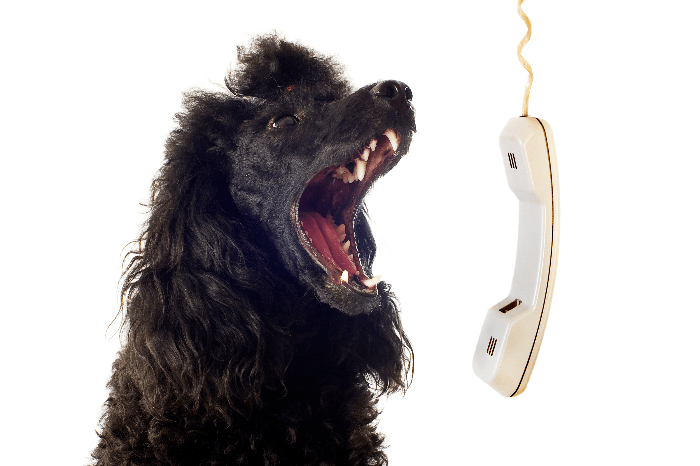It is not uncommon that smaller breeds like a toy poodle and even the miniature poodle to have quite the reputation for being avid barkers.
Every dog has the tendency to bark but sometimes it’s simply unwanted. The biggest key to stopping unwanted barking it’s to understand the very reason your pooch is barking in the first place. Once you have a good understanding you will know what to do you know what to do in order to stop it.
Let’s take a look at the main reasons a poodle bark and what you can do to save your hearing and also to help your poodle get what you both want. It’s a win-win situation.
Reasons for Barking
Much like people, poodles can have triggers that set them off. Kind of like that time when your in-laws…nevermind. These triggers are quite a bit different than ours but it’s important to understand. “Trigger Barking” is simply a situation, noise or movement that causes your dog to bark.
Common Triggers for Barking include:
- Boredom
- Excitement
- Being left alone (separation issues)
- Guest entering the home
- Cars, people or animals walking by
- Weather (normally thunderstorms)
The good thing about these common triggers is that training and socialization can quickly nip this in the bud.
One of the most common reasons why dogs are triggered to bark is because they are left at home alone. This often leaves your poodle agitated and anxious. This is called separation anxiety.
If it is apparent that your dog is suffering from this we have a piece of much more in-depth information on the topic. You can find it here on our page on Separation Anxiety.
When it comes to barking at guests, people, or other animals nearby this can seem like a pretty normal occurrence. While it may be cute when your poodle is a puppy, it is something that you will want to get a handle on. Socializing and training your poodle will greatly reduce their urge to express themselves vocally when something like this happens. Yes, even when the doorbell rings.
Don’t react to your barking dog
It is in our nature to want to blurt out the words “no” automatically when our poodle is not behaving the way that we want. In addition, we also may want to audibly reprimand our dog. However, when it comes to being truly successful at training and socialization we must resist the urge and instead, ignore our poodle when they are barking. Or…when they are barking and nudging us, or barking and jumping up and down like a jackrabbit. All negative behavior should be completely ignored.
When you ignore your dog and don’t give them the attention that they are seeking, they will better understand the behavior you are looking for from them. On the other hand, if you give your dog attention, whether it is positive or negative attention they will not have a clue what you expect from them. As a result, the unwanted behavior will continue.
This may seem a bit odd to some right. I mean, why not just say “no”? Well, the short answer is, if you say “no”, you simply giving them attention. Since dogs, yearn for human interaction when you take it away, it is much more effective and easier for them to understand.
Boredom

Yes, even your poodle gets bored from time to time. Just when we thought working in a cubical farm was the definition of boredom. Consider how bored your dog could be at home all day without anything to do.
Your poodle may bark non stop if they are not socialized at a young age and especially if they don’t have a good selection of toys.
There is no such thing as spoiling your dog when it comes to toys. Be sure that your poodle always has toys and puzzles to keep them entertained.
Excitement
Loads of poodles bark due to sheer excitement. You’ll see this more often in puppies who at times can become so excited they tinkle a little.
If this happens with your poodle, don’t be alarmed. You don’t have to be concerned that your house training isn’t working. This type of situation is more of a behavioral issue that typically subsites as your puppy ages. Puppies are also more prone to tinkling when you use a high pitched voice when speaking to them.
As for older poodles, you’ll find that they turn into maniacs when you return home for the day and bark, run, jump and spin around as you make your way through the door. This is a situation that occurs with other breeds as well.
One of the best ways to cut down or eliminate this is to simply ignore your dog completely when you return home. Sure it may be a bit difficult at first, but it is well worth it in the long run. Even though you are just as excited to see your dog, you must resist the urge.
So, next time you return home, pretend that you do not even see your poodle. Completely ignore them. Remove your shoes, jacket, check the mail, unload the dish washer…anything but acknowledge your poodle. Do this for at least 3-5 minutes.
Once your poodle is completely calm and you have waited a bit as instructed, then it is ok to greet them, play or take them for a walk.
Over a period of time, you will notice that your dog is not overly excited to see you when you return home. In fact, you may wonder if they missed you at all while you were gone (kidding).
Socializing your Dog to Loud Noises and Thunderstorms
Does your poodle bark for what seems like an eternity during a thunderstorm? Well, you aren’t alone. Most dogs, including poodles, have keen senses that are at their peak during thunderstorms.
There are some great ways that you can help to socialize your Poodle and prepare them for storms.
A good way to help to prepare your poodle for the next storm is to find and play the recording of a thunderstorm. At first, you will want to introduce it to them for short periods of time at lower volumes. Then over time increase both the duration and volume.
You can also do the same thing and expose them to loud noises and recordings. This works especially well for puppies. What you’ll find is that it desensitizes your dog and over time these loud noises and sounds will be just another sound.
Socializing your Poodle to New Guests

We’re all pretty familiar with this scenario. Your friend or family member come over and they ring the doorbell. The dog goes nuts and runs around barking like a rabid dog. Well, maybe not like a rabid dog but you get the point. Not only can it take quite a bit of time to calm your dog down it can be an uncomfortable or embarrassing experience for you and your guest.
Let’s be honest, everyone loves a well-behaved dog, and at this moment your poodle isn’t putting you in the best light. So what can you do about it?
With a simple exercise and with the help of a friend you can help to make this behavior a thing of the past.
If this is a big issue for you and your poodle check out our full guide on how to stop barking at the doorbell.
One thing that works well most of the time is to actually meet your guest outside and even take a quick walk together. Down the block and back is usually enough. Afterwards, you may want to send your guest inside first, allow them to get settled and then bring in your dog.
You’ll find that this will usually help your dog relax. From there, you’ll want to be sure to control the situation. This means, keeping the leash your your dog so that you can make any necessary corrections should they jump on your guests for instance.
While your dog is calm and not barking, consider giving them treats occasionally to help reinforce the behavior you want while you have guests.
Barking at Night
This has to be one of the biggest headaches of all time, am I right? It’s a super frustrating issue and it’s something that you’ll want to (need to) correct as quickly as possible. If you ever hope to have a good night’s sleep again.
When tackling this problem it’s important for your dog to understand that barking for attention is not acceptable.
Now, so long as your dog has been taken out to relieve themselves before bedtime and you are certain it isn’t a plea for a bathroom break then you’ll want to try the “quiet” command.
One of the best ways I’ve found to deal with barking at night is to simply repeat the word “quiet” in a nice calm voice a couple of times. Then completely ignore the barking altogether. It may be a bit difficult at first, and you may think that the barking is never-ending. But eventually, your dog will stop barking and understand that barking at night will not get them the attention they desire.
It does go without saying that your dog may also need something to do if they are not ready to fall asleep when you put them in the crate for the night, or when it’s bedtime. Always leave them with a few of their favorite toys at night on the off chance the barking is due to boredom at night.
Severe Barking at Night
Over the years, I have found that one of the best ways to cut down on severe nightly barking is to move your poodle into the same room as you. This isn’t something you have to do forever, but it should accelerate the behavior you’re looking for…a quiet poodle at night.
Our dogs tend to closely mimic our behavior. If we are active, they are active as well, when we are rest, they tend to relax and remain calm. In this case, when you’re laying down in bed you should just lay there and wait for the barking to stop. Again, this can seem like an eternity, but over time the barking will subside and you both will be able to sleep peacefully. In this situation, it is important to be patient. You may even want to go bed 30 minutes early in order to give your dog some time to settle down.
Quick fixes to stop dog barking
While we used the term “quick” these are just a few things that you can start off with to see if it makes a difference with your poodle. Make no mistake, this can sometimes be a process and take a bit of time before your dog catches on.
Exercise
Chances are, your poodle is not getting nearly enough exercise as it needs. Check out our page on poodle exercise for more information and ideas around this.
With that being said, if you find that your dog is doing a lot of barking during the day it may be a good idea to make sure that they get a good amount of physical and/or mental exercise before you leave in the morning. Typically, a well-exercised dog is a tired dog and more likely to rest while you are away.
Enlisting the help of a dog walker may also be a good idea if you’re short on time or if your schedule doesn’t always allow for long walks and exercise sessions.
Socialization
Let’s face it, you probably find that your poodle barks at other dogs, animals, and people if they haven’t been exposed or “socialized” enough. It’s important that you expose your poodle to as many positive experiences as possible and expose them to people and animals of all shapes, sizes, and ages. If possible, this includes people on bikes, runners, children, dogs, people walking by, etc. The more you socialize your pup, the less likely they will feel the need to bark.
One great tip we can give on socializing your poodle is to have strangers, friends and family meet your poodle (after giving the sit command), and have them give him a favorite treat. Over time, he or she will associate this positive experience with people and will soon see them as just another part of their walk. This will lead to less barking and jumping on strangers while in public.
Buy Toys and Puzzles
There are loads of products on the market that will entertain your poodle. Poodles are such an intelligent breed and they will become bored if they don’t have anything to do that will keep their mind active. A bored poodle can lead to mischief.
There are great toys that squeak, others that spit out treats, and even those that you can place treats inside of. Check out our list of the best toys and puzzles for poodles.
Manage Environment
Once you’ve identified what makes your dog bark you may find some success by controlling their environment a bit more. For instance, before you leave for the day it may help to leave on the radio or television which may help to keep your dog calm and give them a feeling that you are still home.
If you find your poodle goes into a barking frenzy when it sees another dog through the window, perhaps you might want to consider closing the blinds before heading out. This way, they will be less tempted to bark.
Keys to Successful Training and Socializing
Things to Remember
There are two key things to remember in order for your time spent training and socializing to pay off.
- You must be fully committed to training on a frequent and consistent basis. You can’t give up after just a few tries.
- You must always be sure to give your poodle positive reinforcement or praise whenever they are behaving the way that you want.
If you can stick to these two things, you’ll be well on your way to curbing your poodle’s barking and you’ll be able to spend more enjoyable moments with them.



